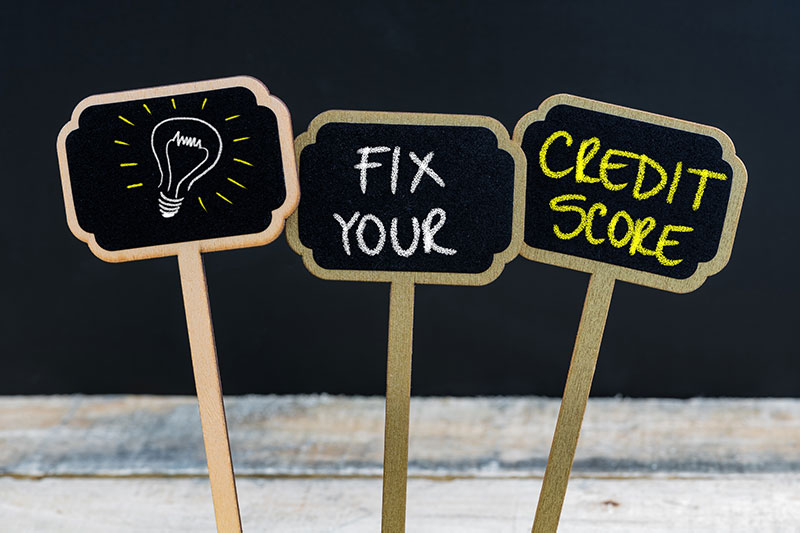7 MinsJuly 29, 2020
Has your loan application been rejected, and that too, several times over? Most of the times the reason could be your poor credit score. Your credit score reflects your credit behaviour and creditworthiness. Creditworthiness is your ability and willingness to repay the loan.
Credit information bureaus such as CIBIL, Experian, Equifax, HighMark, etc. evaluate your credit behaviour and creditworthiness to assign a credit score measured on a scale of 300 to 900. This is based on the repayment data shared by lenders to the credit bureaus.
Lending institutions such as banks, Non-Banking Financial Companies (NBFCs), and Housing Finance Companies use credit scores as one of the determining factors to gain insights of their customer, evaluate the risks, and to make effective credit decisions.

Typically, a credit score of 750 and above is desirable. Higher the score, the better it reflects on your creditworthiness, as a borrower or loan applicant.
Let us see some of the factors that could impact your credit score:
1. Not paying outstanding dues on time – Missing payments or not paying dues on time does not reflect well on your creditworthiness. If this is a persistent habit, it will surely weigh down on your credit score (as it is reported as delinquency). Every rating agency assigns a certain weightage to this criterion and repaying dues should not be taken lightly. Not just loans, but ensure you also pay credit card dues, utility bills, and any outstanding dues on time. Paying outstanding dues on time is always in the interest of your long-term financial wellbeing.
2. Multiple applications for loans and credit cards – When you submit multiple applications to one or many lenders for a loan, it is recorded as a hard inquiry for a new line of credit and negatively impacts your credit score, depending on how much new credit you attempt to avail and the nature of the loan (secured or unsecured loan).
Similarly, if you have been applying for multiple credit cards and your repayment history for the ones you already use is patchy, the credit score takes a beating. Also, the risk is that you are pulling yourself into a credit card debt trap.
Keep in mind, if you have been applying for loans and credit cards at short intervals, it reflects that you are often in dire need of funds – and that’s a negative.
Ensure you maintain an optimal level of debt (around 25-30% credit utilisation) and fair balance between secured loans and unsecured loans (the credit mix).
3. Making expensive purchases on credit cards or consumer loans – Making expensive purchases on credit cards and utilising the maximum credit limit, at times, is perfectly fine as long as you have the means to repay all the dues on time. But when you fail to repay your dues or pay only partially, it adds to your debt burden. The revolving credit (high credit utilisation) negatively impacts the credit score.
So, consciously make an effort to keep your credit utilisation below 30%.Similarly, repeatedly availing of consumer loans to purchase high-value items should be avoided, as it may harm your credit score.
[Also read: What should be my credit score to avail loans?]
4. Lowering credit card limits and/or cancelling a credit card – When you attempt to lower your credit card limit, the credit utilisation ratio (calculated as the total outstanding balance on the credit card divided by the total credit limit on the card) increases. This, in turn, causes the credit score to drop as a higher credit utilisation is not perceived positively by credit information companies for rating purpose.
Say, your credit card limit was Rs 1 lakh and outstanding dues are Rs 25,000, but you chose to lower the credit card limit to Rs 60,000 (for whatever reason); the credit utilisation ratio will increase from earlier 25% to 42% (beyond the ideal credit utilisation ratio of 30%) ––regardless of whether in absolute terms the credit is increasing.
Likewise, keep in mind that cancelling your credit card will not have a positive influence on your credit score nor does it improve the credit utilisation ratio. All it does is truncates the credit usage and credit history, which gets factored in the credit score. The age of credit usually has around 15% weight on your credit score.
Hence, to avoid the detrimental effect, rather than lowering the credit card limit (or increasing it), use your credit card sensibly and repay your credit card dues on time. And as long as the credit card is not levying exorbitant annual fees and you enjoy a host of benefits for using the card, as far as possible, avoid cancelling the credit card.
5. Foreclosure of loans – While foreclosure of loan helps to shed the debt burden, the impact of it can be negative on your credit score, particularly if it is a secured loan (home loan, car loan, etc.). This is because it shortens the credit history and your credit account does not reap the benefit (in terms of interest) for the lender. For this reason, a lender may charge you a foreclosure fee depending on the type of loan you have foreclosed and the source of money for repayment. Hence, before foreclosing the loan, evaluate the pros and cons.
6. Filed bankruptcy – God forbid, but owing to your inability to repay loans, you have filed for bankruptcy--- a legal process---and intend to get relief from your lender, an adverse impact will be noticed on your credit score in due time. Moreover, you may be disqualified from availing of loans in the future and be compared with other bankrupt borrowers.
7. Error in the credit report – Error/s on the part of credit information companies while assigning credit score may also have an undesirable effect on your credit score. If ‘default’ is marked against a respective loan (secured or unsecured), but in reality, you are diligently paying or have already repaid, bring it to the notice of credit information bureau and/or the respective lender and resolve.
If you have closed a loan in full, do not forget to obtain from your lender closure letter or No Due Certificate (NDC), statement of account(s), original documents that you may have submitted to the lender and remove lien on assets. All this would act as evidence for you and help you elevate your credit score in future. If the lender has not intimated the credit bureau about the closure of your loan account, do it by yourself (by writing to them and submitting the requisite documents as proof).Hence, look up your credit report every month to check if it is error-free and is not negatively impacting your credit score.
Disclaimer: This article has been authored by PersonalFN, a Mumbai based Financial Planning and Mutual Fund research firm. Axis Bank doesn't influence any views of the author in any way. Axis Bank & PersonalFN shall not be responsible for any direct / indirect loss or liability incurred by the reader for taking any financial decisions based on the contents and information. Please consult your financial advisor before making any financial decision.

















